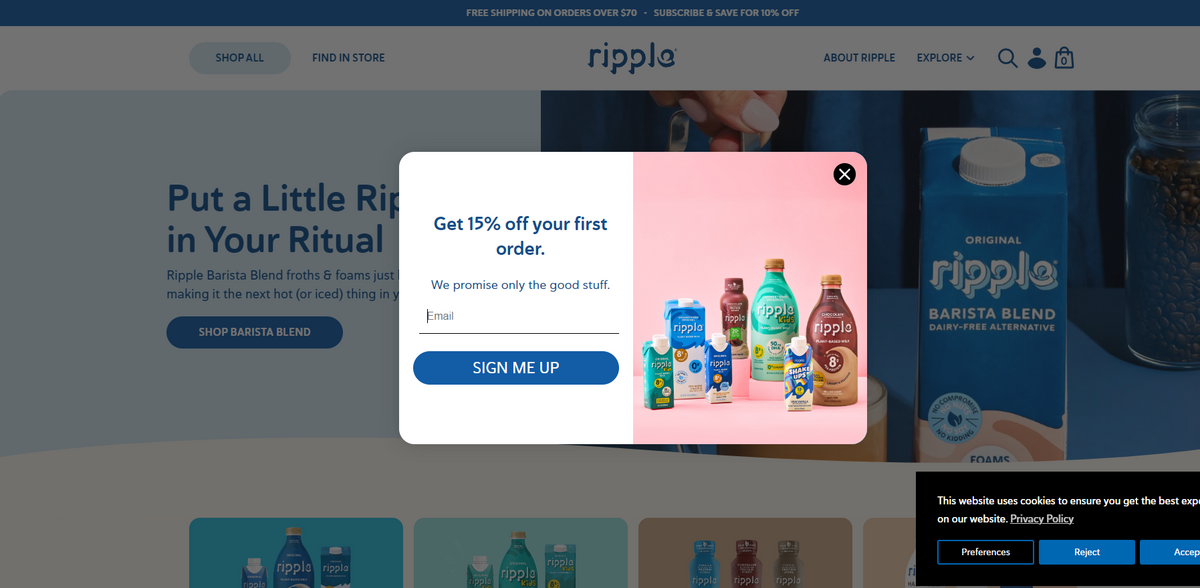What is Ripple Foods?
Ripple® harnesses the power of the small but mighty yellow pea to make waves in the world of plant-based milks, shakes, and half & half. This remarkable Food Products project is all about creating delicious, sustainable alternatives that enhance cereal, coffee, shakes, breakfast, lunch, dinner, and snacks—without dairy, allergens, or compromises. Ripple Foods, PBC, stands out for transforming a humble pulse into a source of protein that delivers taste and nutrition. Even the smallest actions matter, and Ripple shows that by tapping into the regenerative power of yellow peas, businesses and consumers can enjoy a product that is both tasty and mindful of its impact on the planet. With a bcorp score of 106.9, this project has earned respect in the industry while pushing forward with social and environmental accountability.
Main Benefits of Ripple Milks
The Ripple project offers a range of benefits that make it a top choice for those seeking a better-for-you, environmentally friendly drink. The key figures and facts include:
- Ripple’s process uses up to 87% less water than almond milk and 86% less than dairy milk, giving a serious edge in conservation.
- Its CO2 output is 80% lower than dairy milk and lower than alternatives like almond, coconut, and cashew milk.
- Nutritional comparison: 1 cup of dairy milk contains 12g of naturally occurring sugar, 8g of protein, and 293mg (20% DV) of calcium whereas 1 cup of Ripple Original milk contains 6g added sugar, 8g of protein, and an impressive 440mg (30% DV) of calcium.
- Regular almond milk lags behind by offering only 1g of protein per cup.
- Ripple’s production also helps decrease reliance on chemical fertilizers since yellow peas naturally add nitrogen back into the soil.
Sustainable Innovation in Every Sip
This project’s journey is rooted in the belief that innovation can come in small packages. The method of harvesting protein from yellow peas without the signature pea taste was a breakthrough—plant-based gold, some might say! It kicked off a revolution where taste meets sustainability, showing that natural ingredients can drive big change. The process is not only patented, but it also redefines how modern consumers enjoy familiar products like milk without compromising flavor or quality. As progress happens, Ripple continues to surprise with its clever use of everyday natural ingredients… offering not just nourishment but also a boost for environmental care.
Environmental Accountability and Transparency
Ripple is built on more than just innovative food production—it’s built on strong environmental ethics. The company meets the highest standards of verified social and environmental performance, public transparency, and legal accountability. Every step, from sourcing to production, ensures that the process is as clean as the product itself. By using peas—a regenerative crop that restores nitrogen into the soil—Ripple eliminates the need for extra fertilizers. This smart and sustainable approach not only supports soil health but also reduces the overall carbon footprint. Ripple’s achievements in reducing CO2 emissions and water usage serve as a fine example of how food products can be both delicious and responsible.
Nutritional Excellence and Healthy Choices
Comparing traditional dairy and other non-dairy alternatives reveals Ripple’s clear advantages. Pour for pour, Ripple comes out ahead in numerous milk match-ups. This isn’t just a product; it’s a nutritional statement. For instance, dairy milk’s 1 cup offers 12 grams of naturally occurring sugar, 8 grams of protein, and 293 milligrams of calcium, while Ripple Original milk uniquely provides 6 grams of added sugar, the same 8 grams of protein, but bumps calcium up to 440 milligrams (30% DV). Even regular almond milk, with its 1 gram of protein per cup, makes Ripple’s punch of nutrition even more impressive. The clear nutritional benefits make Ripple a winning choice for those striving to maintain a balanced diet without sacrificing flavor.
Project Impact on Global Sustainable Goals
- SDG 2: Zero Hunger – Promoting better nutritional options.
- SDG 6: Clean Water and Sanitation – Using significantly less water than traditional milk alternatives.
- SDG 12: Responsible Consumption and Production – Fostering innovative production methods with reduced carbon footprint.
- SDG 13: Climate Action – Lowering CO2 emissions by 80% compared to dairy milk.
- SDG 15: Life on Land – Enhancing soil health by utilizing regenerative crops that replenish nitrogen.
Commitment to Quality, Taste, and the Planet
Ripple’s philosophy is simple: even the smallest actions can have far-reaching impacts. Beyond just being a plant-based alternative, Ripple makes cereal, coffee, shakes, and even half & half exponentially better. The delicious, lip-lickingly good taste comes as no surprise, given its carefully honed process that neutralizes any unwanted pea flavor. With all peas grown in the Midwestern U.S. and across Canada, Ripple’s commitment to quality and local sourcing is clear. The innovation behind harvesting protein without compromising flavor has not only paved the way for healthier dietary choices but has also set a new standard for sustainable production in the Food Products industry. Every sip is a nod to environmental accountability, social responsibility, and above all—a commitment to maintaining delicious flavors while caring for the planet.


















